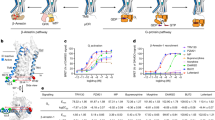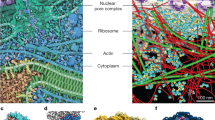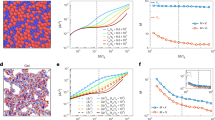Abstract
WE recently showed that the nuclear magnetic relaxation rate of benzyl alcohol is increased in the presence of erythrocyte membranes and we concluded that this is caused by restriction of the molecular motion of the alcohol molecules imposed by the membrane structure1. With changes in alcohol concentration the relaxation rate altered in a characteristic way (Fig. 1), and it was suggested that alterations in membrane structure were induced by the alcohol which might be correlated with the physiological changes found in anaesthetic action.
This is a preview of subscription content, access via your institution
Access options
Subscribe to this journal
Receive 51 print issues and online access
$199.00 per year
only $3.90 per issue
Buy this article
- Purchase on Springer Link
- Instant access to full article PDF
Prices may be subject to local taxes which are calculated during checkout
Similar content being viewed by others
References
Metcalfe, J. C., Seeman, P., and Burgen, A. S. V., Mol. Pharmacol., 4, 87 (1968).
Whittaker, V. P., Prog. Biophys. Mol. Biol., 15, 39 (1965).
Author information
Authors and Affiliations
Rights and permissions
About this article
Cite this article
METCALFE, J., BURGEN, A. Relaxation of Anaesthetics in the Presence of Cyto-membranes. Nature 220, 587–588 (1968). https://doi.org/10.1038/220587a0
Received:
Issue Date:
DOI: https://doi.org/10.1038/220587a0
This article is cited by
-
Lidocaine increases lung uptake of propranolol
Lung (1986)
-
Effect of phenothiazine derivatives on the thermotropic phase transition of liposomal phospholipid membrane
Archives of Pharmacal Research (1986)
-
Hydrophobic membrane interaction of etidocaine, bupivacaine and 2-chloroprocaine
Naunyn-Schmiedeberg's Archives of Pharmacology (1982)
-
High-resolution NMR studies of complexes of drug molecules with biopolymers and biomembranes
Pharmaceutical Chemistry Journal (1976)
Comments
By submitting a comment you agree to abide by our Terms and Community Guidelines. If you find something abusive or that does not comply with our terms or guidelines please flag it as inappropriate.



